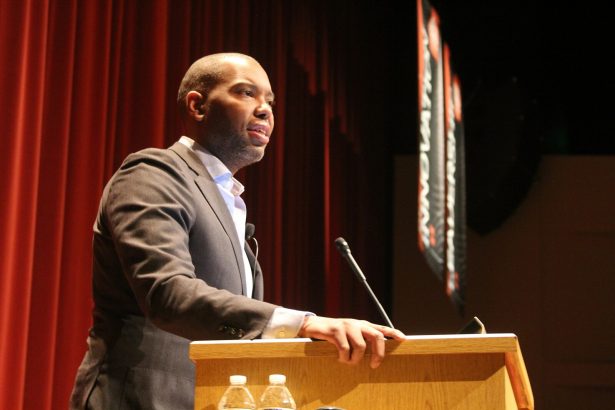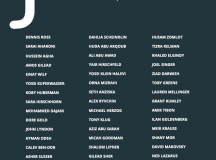Barry Finger reviews Ta-Nehisi Coates’ book The Message. Finger is a frequent contributor to US socialist journals, a former shop steward and activist with the Public Employees Federation.
What happens when a widely acclaimed talent commits himself to an all-encompassing gospel of American racial oppression and projects it onto the African continent and the Middle East? And what happens when, in addition, this is done by first expunging the intricate histories of Arab, Muslim and Ottoman conquest, colonisation, enslavement and persecution from his narrative? What happens when you flatten history to two dimensions?
You end up with The Message, a rendition that casts history as a grotesquely distorted—often-intertwined—cascading series of dancing Rorschach-like shadows on a wall. It is the great conceit of Coates that he claims to discern a familiar pattern of American racial politics in the interplay of these silhouettes. And so satisfied is he with his ah-ha moment that he can claim, as his Holmes might say to our Watson, that there is, in fact, nothing complex or nuanced about it. You only need the proper racial instincts.
Sucking truth out of his thumb
Coates locates these proprietary instincts within his interior Jungian psyche. ‘The gift’, to be sure,’ is not in the blood but in the stories, the axioms, the experiences garnered from centuries of living on the outskirts of a dubious democracy.’ As a younger man, he confessed some skepticism about tapping into these unrefined gifts, ‘which seemed so diffuse and random, a kind of folk wisdom that stood in abeyance of the empirical.’ But he is reassured that these glimmers of light can be sharpened and focused by ‘examining the stories we have been told, and how they undergird the politics we have accepted, and then telling new stories ourselves.’
Coates thereby reveals a disturbing tension. He announces from the outset that ‘we never practice writing solely for the craft itself, but necessarily believe our practice to be in the service of that larger emancipatory mandate.’ But that activist mandate, once proclaimed, is not in the pursuit of overarching emancipatory truths that speak to our common humanity, but of upending the myths of the oppressors and the self-serving intellectual facades that excuse and ennoble them with a new set of myths and narratives that uplift and sanctify the oppressed. There is nothing objective about Coates truth. It is simply the shot-gun marriage of power with narrative, an exercise in agit-prop.
Stated otherwise, he is uniquely situated—one might hesitatingly say, privileged—to suck truth out of his thumb. Seduced by his own erudition, he proclaims, ‘I don’t really care much for hearing “both sides” or “opposing points of view.”’ For he ‘has no interest in hearing defenses of the occupation and what struck me then as segregation.’
So be it.
But behind the ‘it’, is an embedded moral warning: tread lightly. To challenge Coates on empirical grounds or worse from a competing ideological perspective is to question not only Coates himself, but the lived and historical experiences of African-Americans writ large. Needless to say, this is an implicit exercise in preemptive intellectual extortion of a type all too lamentably common today in ‘progressive’ circles.
Coates’ historical innocence
The meat of Coates’s book resides in the Israeli/Palestinian fourth section, ‘The Gigantic Dream’. But the historical and social innocence that precedes it scatters portents of things to come. After a preliminary section reprising his formative experiences that gave way to a teaching stint at Howard, his reluctant foray into small town America in defense of his writings and the welcome rise of unforeseen grass roots white allies in that adventure, his physical journey—entitled ‘Pharaoh’—starts in Senegal, his first trip to the African continent. It is an interior journey through the spectral horror and aftermath of being ripped from the homeland made all the more poignant by the imagined regal glory of an ancient Egypt left behind.
There is a narrative subtext here: a progression from the academic world of ideas, to a voice resonating down from the national stage to the neighborhood level about the traumas of race and racism, to be amplified ever higher as a partisan in a conflict on the world arena, which, for him, is the international continuation of the American drama.
Coates steels himself for his sojourn with a meditation on the work of Josiah Nott, a nineteenth century anthropologist and slaveholder. Nott was a pioneer in racial ‘science,’ which challenged the monogenic theory of human origins and evolution. By rejecting the presumption that humankind evolved from a common root, his ‘Ni**erology’, as Notts termed his studies, was summoned to prove a racial hierarchy that self-servingly justified slavery on the basis of distinct and unrelated orders of humanity.
Another separate, distinct and inferior order of humanity in his ‘Ni**erology,’ that vitally concerned Notts, but evidently is of no notice—or gives no pause to Coates if he had noticed it—was the Jews. Some of the titles of Nott’s ‘classics’ may have offered a not-so subtle hint: The Physical History of the Jewish Race, ‘An Examination of the Physical History of the Jews, in its Bearings on the Question of the Unity of Races’ and Types of Mankind or Ethnological Researches. Tudor Parfitt’s innovative study, Hybrid Hate, unearths the deep connection from the Renaissance to the Third Reich between anti-black racism and antisemitism. ‘This joint construct of negrophobia and antisemitism, the collision of the Western world’s two major racisms,’ Parfitt writes, ‘was built from hundreds of years of polygenist speculation, sexual panic, and the repulsive shared otherness that had been a perceived characteristic of Jews and blacks since the sixteenth century. It implied that subversive, predatory, pornographic character traits were somehow inscribed in the physiological fact of the negro/Jew.’
Franz Fanon understood that an antisemite was necessarily a Negrophobe, the subject of the same loathing. ‘When you hear people denigrating the Jews, prick up your ears, they’re talking about us.’
Why bring up this lost connection? In part, because of Coates’s willful blindness to the deep cultural waters that nourish the casual anti-Zionist tropes he so unreflectively traffics in. Otherwise, he might have asked himself whether the anti-Israel fever could attain peak delirium absent a worldwide mass movement preconvinced and/or predisposed to being convinced of the Jewish state’s innate land-grabbing, blood-lusting defilements.
If he had any hesitations or second thoughts, he certainly never gives voice to them. Yet, clearly the spontaneous celebrations that attended the pogrom of 7 October swim in a sea of cultural suspicion; an exuberance that resides in their joyous re-imagining as righteous blowback for far greater insidious outrages that ‘must’ have precipitated them: ‘It didn’t start on 7 October.’ Outrages Jews are uniquely guilty of, judging from the silent indifference—the global yawn—that attends most every other world conflict, save perhaps that of police violence against American Blacks, which is seamlessly fused in the progressive niche psyche as the same malignant Jew-inspired injustice. And which sees the Middle East as a quintessentially American drama.
For all his writerly sophistication, however, it is not Coates’s cultural blinders, but his stunning historical provincialism that is even more shocking. He speaks eloquently for a community whose scars are a living testimony to the pillage of Africa through the trans-Atlantic slave trade and its enduring aftermath.
Very well. But the African diasporic experience of slavery was not confined to the new world. According to the economic and demographic historian Paul Bairoch ‘compared to the European-organised slave trade, the Muslim world’s slave trade started earlier, lasted longer, and, more importantly involved a larger number of slaves.’ (A stomach turning one-minute silent newsreel exists of an Arab-Slave Market in North Africa, presumably at the cusp of the 20th Century, on the YouTube website of Black Diaspora Maps.)
The Franco-Senegalese historian and anthropologist Tidiane N’Diaye powerfully concluded that ‘The Arab-Muslim trade in black Africans involved 17 million victims who were killed, castrated or enslaved for more than 13 centuries without interruption.’ One of history’s great slave revolts, the African Zanj rebellion in Basra, lasted for 15 years and defeated several armies before being suppressed.
Senegal, where Coates’ African pilgrimage begins, was not only the transport hub of the trans-Atlantic slave trade, but also the nodal point for the trans-Sahara trade in human flesh.
Were it not for the industrial scale castration of Africans, there might otherwise be large Afro-Arab communities in the Middle East. Yet outside Egypt, Mauritania, Morocco and Sudan Afro-Arabs are a negligent percentage of the population.
The land of the Pharaohs, of Africa’s lost splendor, that so inspires Coates, no longer exists ethnographically. The original inhabitants were today’s Copts and Nubians. The ancient Egyptian Empire was first conquered by the Greeks and Romans. But throughout Egypt kept its identity. It was only after the Arab/Muslim conquests that Egypt was repopulated and the original inhabitants reduced to a beleaguered and persecuted minority. This is how Egypt became an Arab state.
Arab-Islamic expansion resonated with the Nasser doctrine and continues to fuel expansionist ambitions. It brought the entire Nile headwaters under Arab rule; conquered, Islamicised and Arabised black Africans and annexed black African lands in Southern Sudan. Egyptian Nubians were resettled far from their ancestral homelands to barren areas near Aswan.
This ‘doctrine’ was behind the import of Arab settlers into Darfur, Nubia and Mauritania, to the changed demographics of black African nations; behind Morocco’s relationship to Western Sahara and Libya’s long campaign to annex Chad’s Auzou strip. To quote Bayan Abubakr, of Yale University, ‘Anti-Blackness and its enmeshment in north, west, and east African trade routes defined by slave labor and the slave trade are foundational to the histories of Africa and the so-called Middle East.’
Why bring this up? Because, first, the history of Black and native oppression does not begin and end with Western imperialism, Western slavery and Western racism. What can we make of an anti-imperialism supposedly informed by the 1619 project, that sees in the return of the indigenous Jewish people to the land of their origins—a return resulting in a homeland for half of world Jewry—a colonialist crime, but the distribution of Arab peoples and the Arabisation of the Levant, North Africa, the Sudan, Mauritania—and yes, Palestine as naturally occurring events? And, what can we make of a perspective so incurious that it never suspects that these conquests and these slaveries may have generated their own ideologies, narratives and stories and that these ideologies, narratives and stories may be every bit as toxic and racist as those that attended European expansionism?
And that Jews, as well as Africans, might also be at the poisonous end of them?
Coates visits Israel for 10 whole days
And so our hero ventures to Israel/Palestine obliviously believing in a universal subaltern, an exclusive object of European and western enslavement giving rise to an international fraternity of people of color in struggle. Shepherded by Palestinian activists and partisan NGOs, Coates cannot help but wonder how Israel is plugged into all this, although we all know by this point what ‘all this’ is.
Visiting for 10 days in the summer of 2023, Coates reprises, absent the slightest hint of originality, a curated litany of Palestinian fed Kangaroo-court style charges against Israel. Others, such as the X (twitter feed) of @Aizenberg55 and Coleman Hughes’ substack and Free Press reviews have effectively and convincingly refuted them, and even they do not scrape the surface of unconsulted texts. What can you say about someone pretending to relive a Jungian trauma at an Israeli Bull Conner, a black Israeli Bull Conner at that—though ‘politically white’ to Coates, for being part of an oppressive power structure—for having to wait 45 minutes at a security check point?
There is no discussion of the Arab wars of aggression in 1967 and 1973 that gave rise to the occupation. No mention that Israel is bombarded relentlessly by terrorist groups hell-bent on the state’s annihilation. Nor that this might account for the security cameras, check points and screenings. No discussions of the failed negotiations to end the occupation; the deadly intifadas that erupted at the prospect of any negotiation that might have ended with the acceptance of Israel. No discussion of the terms of Israel’s offerings, which acceded to everything the international community demanded of it—withdrawal from 97 per cent of the West Bank, and compensatory land swaps comprising the difference, a shared capital in Jerusalem and a land bridge to Gaza.
There is no expectation that Palestinians exercise agency; no recognition that they could take the initiative and sue for peace. Nor that a Palestinian peace offensive might offer the Israelis, in exchange for a nonaggression pact and a mutual discharge of competing claims, peace for land. Nor that they could offer the Israelis the prospect of resolving future disagreements through brokered negotiations, binding if necessary. There is no belief that Palestinian peace negotiators could speak over the heads of the terrorist factions and Israeli chauvinists directly to the Israeli people—and remain among the living.
And therein lies the dilemma. Would Germany ever be free of occupation if its dead ender Werewolf brigades called the shots and for 50 years vowed to continue World War II at the most propitious moment? And yet Israel is expected to relinquish its occupation under not too dissimilar conditions.
The point is this. If any of Coates’ invocations were good faith efforts by an honest critic seeking to redress Israel’s democratic deficits and broaden the rights of its minorities, and ease the life of the occupied, they would be welcomed. They are not. So, I understand and sympathise with why Aizenberg and Hughs are loath to leave such charges unanswered. Coates’ accusations are mendacious. Israel in his view is innately illegitimate. The rest is just fog. But the ever-revved fog-machine serves a demagogic purpose: to keep Israelis and their allies permanently off kilter and on the defensive. A robust defense of Israel invariably risks coming across as partisan apologia, for no country is without blemish; concessions to the possibilities of crimes and flaws open the way for a tendentious cascade of secondary accusations and the hope for more concessions. Where do you hold the line? It’s impossible to disable this mendacious machinery through an appeal to facts, reason and historical comparison. It is powered by too many deep sources of political and cultural animosity. You have to resign yourself to live permanently under a smoke cloud of suspicion.
So rather than address each and every charge—rather, in other words, than holding the line—might it be better to lay it on the line?
If democratic deficits and invidious treatment of minorities disqualified nations from existence—if any and all social inequalities and unacknowledged crimes rise to the level of ‘Jim Crowism’ and ‘apartheid’ as Israel’s are said to; if no nation’s birth was immaculate, as Israel’s was not; if occupations, no matter how unwanted, ill serve the occupied—there would be no nation and certainly no Arab majority nation and no Palestinian entity—that could withstand for a moment the same scrutiny and litmus tests demanded of Israel.
Coates senses retrospectively a growing cognitive dissonance that shaped and also afflicted his inchoate youthful views of the Israeli-Palestinian/Arab conflict. He intuits, even in his earlier naïve self, vague intimations that Palestinians are black and Israelis white. But that’s all they were—vague impressions. The adult Coates is chastened by the knowledge that he had allowed an all too casual acceptance of Western cultural tropes towards Israel/Palestine to warp his outlook, attitudes that travel through the ether of dominant racist power structures. He had even looked, in retrospect—mistakenly, to German reparations to Israel as a template for black reparations. This is, after all, the issue that launched him to prominence. But he has had second thoughts. The situations, he argues, are not comparable because German reparations were issued to a racist state to exercise racist oppression and not to an injured people.
By racist oppression, I presume he means the resettlement of European Jewish refugees from Hitler and from the Arab countries that had pillaged and expelled their Jewish populations in retaliation for Israel’s victory in 1949.
Coates even gets reparations wrong
Still, he misses the most telling point. Reparations were not a demand of the Israeli state. West Germany advanced this initiative in the hope of purchasing world legitimacy through Israeli acceptance. Israeli popular opinion was virulently opposed, from the rightwing Herut to the left wing Mapam, and some of the largest public demonstrations to date were held in protest. It was understandably reviled as ‘blood money,’ and an unconscionable affront to Jewish dignity. Ben-Gurion nevertheless reluctantly swallowed this bitter pill only because the impoverished Israeli state was desperate for resettlement funds and had few other sources
The lesson is lost on Coates. Israel didn’t want nor did it seek an alliance with post-war Germany. It twisted itself in knots over it. They resisted the exchange of ambassadors for several more years. The Jewish state bitterly resented being used.
The Palestinian movements, and I assume he means by this the Popular Front, the PLO, Hamas, etc., (though none are ever mentioned!) seek, as did West Germany with Israel, being credentialed and authenticated by the American civil rights movement. And by prominent Black intellectuals, feted and flattered, such as Coates. It is their entrée to respectability and acceptance, a fully paid membership card to the People of Colour Internationale. A good deal, indeed, for Palestinian terror groups pursuing legitimacy while making no discernable contribution to the advancement of Black freedom and equality.
Coates cherry-picks history
But what exactly does any wing of the black freedom movement stand to gain—and, what does it risk undoing—by being seen as apologists and fronts for Palestinian revanchism and terror? The potted satisfaction of being on the ‘right side of history?’
What then is that elusive right side of history? Evidently, the decolonising side, when one painfully ‘discover(s) … your own illegitimacy—that whiteness is power and nothing else.’ Coates cherry-picks from the writings of pre-state Zionist thinkers to ‘prove’ that the movement acted as brazen white colonists seeding Jews in an historical homeland they were, in their mass, long absent from, save for an enduring remnant. Though these quotes may be revelations to him and his audience, they are standard fare in the anti-Zionist canon. He could have saved the ink. It is blatantly obvious that ‘decolonisation’ is nothing other than Israel eliminationism. The rest, such as these decontextualised quotes, are just backfill.
As Fred Halliday argued, ‘Contrary to the claims of nationalists the world over who claim their nations existed from time immemorial, all nations are in fact historically formed … The fact of immigration is also not a serious counter-argument: most of the nations in the new world were formed through migration … and in a longer time perspective the whole of the world’s population distribution pattern is the result of migrations at one time or another. If the Israelis cannot be formed in this way, then neither can the Americans, or Cubans.’ Nor, as we have argued above, can the nations of the Levant or the North Africa be considered legitimate nations. Egypt should be returned to the Copts, Syria and Iraq (Mesopotania) to the Assyrians and Chaldeans; the nations of North Africa to the Amazighs, Lebanon to the Maronites, Sudan to the Nubians…
Coates further analogises the colonising Zionists with the tragedy of Liberian experience, where a persecuted fragment of the black diaspora was launched as a Western elite lording it over the ‘natives.’ This is just sloppy. The Zionists were never a minority enriching itself from the labor of exploited Arabs. They, unlike the Liberian elites, did not luxuriate in an apartheid system set up for them by a Western patron. Zionists created a completely independent social system, with a fully elaborated Jewish working class structure.
The best is yet to come.
Conclusion
For the real gem of Coates’s foul screed comes near its wrap up. It is an extended masterpiece in free form riffing. And it stunningly pulls together all the seemingly disparate threads that lead up to it. The following tidbit really doesn’t do it justice, but it conveys the gist. ‘The wars against the Palestinians and their Arab allies were a kind of theater in which “weak Jews” who went “like lambs to the slaughter” were supplanted by Israelis who would “fight back.” Thus a redemption of a different kind was affected: By routing the savage “Arab,” by murdering his leaders, by confining him to the Bantustans of Tuba, or the reservations of Gaza, or the ghettos of Lydd, Jewish national honor was restored in the traditional manner of Western European powers. The “mass mutation” into whiteness was advanced…’
And there it is: the ancient dream of the Jews fulfilled—to become white!
Coates has need for neither history nor politics nor facts. Every war—including the one now being waged against Israel—has been inspired by the vision of Pan-Arab (nationalist) or Pan-Islamic consolidation. Which is to say, that Arab imperialism is above all an anachronistic state of mind. It is an imperialism of accumulation, that is, of holding on tightly to things that are within its grasp and of grasping things that it hopes to hold tightly. It is every bit as much a violation of the equality of peoples as the European imperialism of old. It is fueled by racism and dehumanisation, by imagined victimhood, and by dream of restoring past glories.
And, like its European counterpart, it is entirely mutable.




































